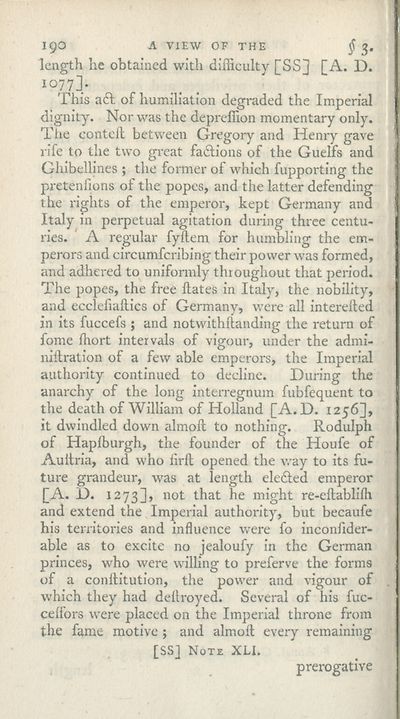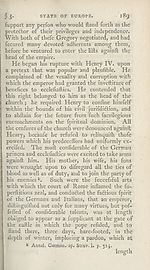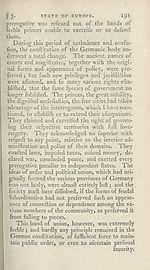Download files
Complete book:
Individual page:
Thumbnail gallery: Grid view | List view

igo A VIEW OF THE <J 3.
length he obtained with difficulty [SSj [A. D.
i°773.
This aft of humiliation degraded the Imperial
dignity. Nor was the depreffion momentary only.
The eontell between Gregory and Henry gave
rife to the two great faftions of the Guelfs and
Ghibellines ; the former of which fupporting the
pretenfions of the popes, and the latter defending
the rights of the emperor, kept Germany and
Italy in perpetual agitation during three centu¬
ries. A regular fyftem for humbling the em¬
perors and circumfcribing their power was formed,
and adhered to uniformly thi oughout that period.
The popes, the free Hates in Italy, the nobility,
and ecclefiaftics of Germany, were all interelted
in its fuccefs ; and notwithlianding the return of
fome ffiort intervals of vigour, under the admi-
niftration of a few able emperors, the Imperial
authority continued to decline. During the
anarchy of the long interregnum fubfequent to
the death of William of Holland [A.D. 1256],
it dwindled down almoft to nothing. Rodulph
of Haplburgh, the founder of the Houfe of
Auitria, and who iirft opened the way to its fu¬
ture grandeur, was at length elefted emperor
[A. D. 1273], not that he might re-eltabliffi
and extend the Imperial authority, but becaufe
his territories and influence were fo inconfider-
able as to excite no jealoufy in the German
princes, who were willing to preferve the forms
of a conllitution, the power and vigour of
which they had dellroyed. Several of his fuc-
celfors were placed on the Imperial throne from
the fame motive ; and almoit every remaining
[SS] Note XU.
prerogative
length he obtained with difficulty [SSj [A. D.
i°773.
This aft of humiliation degraded the Imperial
dignity. Nor was the depreffion momentary only.
The eontell between Gregory and Henry gave
rife to the two great faftions of the Guelfs and
Ghibellines ; the former of which fupporting the
pretenfions of the popes, and the latter defending
the rights of the emperor, kept Germany and
Italy in perpetual agitation during three centu¬
ries. A regular fyftem for humbling the em¬
perors and circumfcribing their power was formed,
and adhered to uniformly thi oughout that period.
The popes, the free Hates in Italy, the nobility,
and ecclefiaftics of Germany, were all interelted
in its fuccefs ; and notwithlianding the return of
fome ffiort intervals of vigour, under the admi-
niftration of a few able emperors, the Imperial
authority continued to decline. During the
anarchy of the long interregnum fubfequent to
the death of William of Holland [A.D. 1256],
it dwindled down almoft to nothing. Rodulph
of Haplburgh, the founder of the Houfe of
Auitria, and who iirft opened the way to its fu¬
ture grandeur, was at length elefted emperor
[A. D. 1273], not that he might re-eltabliffi
and extend the Imperial authority, but becaufe
his territories and influence were fo inconfider-
able as to excite no jealoufy in the German
princes, who were willing to preferve the forms
of a conllitution, the power and vigour of
which they had dellroyed. Several of his fuc-
celfors were placed on the Imperial throne from
the fame motive ; and almoit every remaining
[SS] Note XU.
prerogative
Set display mode to:
![]() Universal Viewer |
Universal Viewer | ![]() Mirador |
Large image | Transcription
Mirador |
Large image | Transcription
| Antiquarian books of Scotland > Kings & rulers > History of the reign of the Emperor Charles V. > Volume 1 > (208) |
|---|
| Permanent URL | https://digital.nls.uk/109184827 |
|---|
| Description | By William Robertson. London : Cadell and Davies, 1798. |
|---|---|
| Shelfmark | ABS.1.76.13 |
| Additional NLS resources: | |
| Description | Thousands of printed books from the Antiquarian Books of Scotland collection which dates from 1641 to the 1980s. The collection consists of 14,800 books which were published in Scotland or have a Scottish connection, e.g. through the author, printer or owner. Subjects covered include sport, education, diseases, adventure, occupations, Jacobites, politics and religion. Among the 29 languages represented are English, Gaelic, Italian, French, Russian and Swedish. |
|---|

